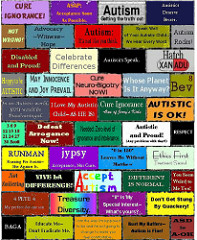“Wow, you take more pills than me,” hubby remarked as I filled up my daily pill-minder for the next week.
I paused for a couple seconds and then answered, “That’s a bit misleading — you take more inhalers.” A bit later, I added, “Besides, a couple of those pills are just calcium supplements, and there’s one prescription I take twice a day.” With the HRT patch, that’s just four daily prescriptions. Going by numbers of pills swallowed isn’t a very good comparison of the numbers of medications we each take; it’s probably close to an equal number, just different kinds of meds and different kinds of delivery systems.
Maybe I was being a trifle pedantic. Then again, the phrasing of the comment made it sound a bit like I was popping a lot of drugs. I don’t think that my hubby meant the remark in a negative way; it was just an off-hand remark meant to fill conversational space while I was puttering around getting ready for bed.
I might not have even noticed — or responded — had I not run into similar comments over the years, comments that were meant to make negative implications. These kinds of statements really bother me, especially because they are a misuse of otherwise good forms of factual communication. There’s an old joke:
When the cabbie got his fare but no tip, he responded, “Well, it’s right — but it ain’t correct.”
These things are not lying outright in the sense of speaking falsehoods, but are deliberately misleading by presenting true statements that lack the necessary context, or that are phrased in such a way as to lead the listener (or reader) to make connections that don’t really exist.
A similar situation was in a staff meeting some years ago. This boss was no longer my primary supervisor, but since I still worked for him a few hours a week, I still conscientiously attended staff meetings when time allowed. He paused to look down at his agenda, and then announced to the group, “Andrea, you made 90% of the photocopies last month.” (This was significant because the copies were paid for from his budget.)
I blinked a few times, surprised at this remark. Well yes, I had made a several dozen photocopies, but … gee, I had made 90% of them? Was I being extravagent? I thought to myself, But photocopies are only a few cents apiece … “Was it very much money?” I asked, concerned, “Do you need me to refund you for them?”
“No, no,” he deferred. “It wasn’t a lot of money.” But the social damage had been done — I looked like an absolute spendthrift, just from the misleading way it had been phrased by my former boss. Bringing it up in a meeting simply made the issue bigger and more public than was necessary.
Well, it’s right — but it ain’t correct.
Such misleading assertions can be difficult to rebut when you’re in the middle of conversation. The other person’s comments are factual, but are also misleading because of the phrasing, what details are presented, and what details are omitted. It’s hard to rebut such statements because you have to stop and think about what particular facts aren’t being mentioned, and then describe why the statement is misleading and what else people should know.
Of course, when the other person who is making such comments on purpose (for devious intent, unlike hubby), they do not want to be corrected and lose face. Their whole point is to set up situations that make other people and their ideas look inadequate, wrong, foolish, or dangerous. This isn’t a reasonable discussion where everyone gets to present their information in an equal manner and be politely listened to. They are quite likely to interrupt you and dismiss your corrections with ad hominem attacks, saying that you are just “splitting hairs” or “explaining things that everyone already knows” or will imply that you are “just confused and don’t know what you’re talking about”.
Of course, such situations are worse when the antagonist is in a position of authority over you. You can end up going around trying to explain what’s really going on to people, and even become hyper-vigilant about catching and correcting mis-impressions. If you’re already on edge due to other stressful issues, it magnifies the stress. If your reputation is already at stake, your nervousness, hypervigilance and willingness to contradict people can then be remarked upon and twisted around as indications for further reasons for your supposed lack of competency. When people make these misleading comments on purpose and as part of an overall trend to discredit and harass someone, it is a particularly insidious type of bullying.
One has to enlist other people who are also “in the know” about what is really going on, and have them speak up when they see such slurs being made, so the bully cannot assert that it’s “just you”.
Such deceiving omissions don’t happen only in work and school. Sometimes they are found in the press as part of sloppy editing or biased reporting. At worst it falls into the realm of “yellow journalism,” reportage that sensationalistic and just this side of libelous. (After all, they are printing “the facts” — it’s just that how things are said, and what is left unsaid will mislead the readership.)
There are an alarming number of events of sloppy writing in the news, such as a recent article in the San Francisco Chronicle, “CDC panel recommends flu shots for kids”
The decision was criticized, however, by parents who believe that a mercury preservative, found in adult flu shots and once common in childhood vaccines, is responsible for rising rates of autism in the country.
“The CDC continues to minimize the dangers of injecting mercury and aluminum into our kids,” said Rita Shreffler, executive director of the National Autism Association. “I’m living with the results as so many other parents are, and it’s just horrific.” Shreffler is the mother of two children, 14 and 15, who developed autism at the age of 18 months after routine vaccinations.
Flu shot supporters said multiple studies have failed to find any link between autism and the preservative, thimerosal. However, the CDC ordered it removed from required childhood vaccines eight years ago, and California law bans it from flu vaccine given to pregnant women or children under 3.
Despite the weak disclaimer attributed to “flu shot supporters” (instead of an overwhelming majority of the doctors and health agencies in numbers of countries around the world), the newspaper continues to advocate the highly-discredited idea that “vaccines cause autism”. Mentioning that the childhood vaccines and flu vaccines for pregnant women and children under three don’t even contain thimerosal does nothing to reduce the emotional impact of the hyperbole in the last quote. They not only sought out comments that will keep the nonsense current in the public mind, but also included the tired post-hoc fallacy that the two children “developed” autism after their vaccinations. Such tales are biased by failing to mention genetic causes of developmental disorders. But mostly the autism-scare story is irrelevant to flu shots.
(Please don’t bother flogging the tired old canard about presenting “both sides of the controversy”. Next time there’s an earthquake, will the newspaper feel obliged to give equal time to “both sides” by interviewing both a seismologist and someone who claims the earthquake was due to the movement by the giant animal that holds up the world?)
Well, it’s right — but it ain’t correct.
When we read or hear news, we need to beware of statements that use not only facts, but also statistics without the necessary context (e.g. that “90%”). Not only are people impressed with numbers in general and view any statement with numbers included as “more scientific or factual”, but a lot of people are not well-versed in understanding how to interpret statistics or any kind of numbers. Even something as simple as a mean average can be misleading — another joke goes:
Bill Gates walked into the homeless shelter, and suddenly the average income of everyone in the room was in the millions.
Numbers are really just more words; there’s nothing magical about them. But with statistics (like so many things) context is very important.
Research studies are also frequently twisted around. Very few people will bother to read the actual study, partly because most people can’t even access the journals they are printed in. Most science research is also so highly technical that it’s difficult for anyone outside the field to be able to properly judge the merits of the testing method, the quality of the data, or the appropriateness of the results interpretations.
A research study will get printed in a journal, get summarised and interpreted for the more-literate public in a press release, then get re-interpreted and very abbreviated by news aggregators, and then local news “personalities” will even further summarise and often tie their own interpretation of the study results to local events or people that may or may not have anything to do with the actual significance of the study. It’s like a giant [parlor] game of “telephone” or “whispers” being played by news-reporters, where every time the message is whispered from one person in the circle to the next, it gets changed just a little bit, so the person receiving the end message gets something rather different than the initial intent.
Whatever the source, these tactics work by suppressed evidence, which allows people to easily develop hasty conclusions. It’s not enough to merely print random facts and to quote people. Knowing what to include, what not to include, and understanding the context is important.








jdc said,
28 March 2008 at 12:39
Re your comment about ‘the tired old canard about presenting “both sides of the controversy”’ – this struck a chord with me. I recently complained to the BBC about their quoting and linking to an anti-vaccination pressure group and was told that they “must link to them… for balance”. I pointed out that what they had done in the name of balance was equivalent to linking to a Flat Earth group to provide balance to a story about the Earth.
Y. S. said,
6 March 2008 at 12:18
Thanks. I’ll check it out.
qw88nb88 said,
4 March 2008 at 16:20
I would recommend the information at this site as an excellent place to start; it has links to further information as well.
andrea
Y. S. said,
4 March 2008 at 11:05
“Of course, such situations are worse when the antagonist is in a position of authority over you …”
I had such an experience several times! What can someone do if he is in such a situation?